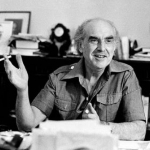Background
Mr. Papandreou was born on February 5, 1919, in Chios, Greece. He was a son of the late George Papandreou (former Prime Minister of Greece) and Sophia (nee Mineiko).









Mr. Papandreou was born on February 5, 1919, in Chios, Greece. He was a son of the late George Papandreou (former Prime Minister of Greece) and Sophia (nee Mineiko).
Before university, he attended Athens College a leading private school in Greece. Andreas Papandreou attended the National and Kapodistrian University of Athens from 1937 until 1938 when, during the authoritarian, right-leaning Metaxas dictatorship, he was arrested for purported Trotskyism. Following representations by his father, he was allowed to leave for the US.
In 1943, Andreas Papandreou received a Doctor of Philosophy degree in economics from Harvard University.
In 1943, the year before he became a U.S. citizen, he began a series of teaching jobs in the field of economics at schools such as Harvard, University of Minnesota, Northwestern University, and the University of California. He returned to Greece and established the Center of Economic Research in 1961. Three years later he gave up his U.S. citizenship and fan for the Greek Parliament to serve under his father, who had become prime minister. His father later appointed him to the position of Deputy Minister of Economics. Both men ran into political trouble again following a right-wing military takeover in 1967.
Mr. Papandreou was arrested and locked into solitary confinement for eight months. Upon his release, which was prompted by pressure from the United States, Andreas Papandreou lived in Sweden and Canada, taught economics, and began to criticize the U.S. Government as he believed it had supported the earlier coup in Greece. In 1968 he became chair of the Panhellenic Liberation Movement, and in 1974 he founded and began chairing the Panhellenic Socialist Movement.
In 1981 he was elected as Greece’s socialist Prime Minister. He worked to modernize Greece, implementing social reforms. By 1989, a year after he underwent heart surgery, Andreas Papandreou resigned under allegations of fraud, embezzlement, and phone tapping. He was also subject to adverse publicity for his public affair with Dimitra Liani, who later became his third wife. He was acquitted of all charges and again was elected as Prime Minister in 1993. After ill health befell him, he was hesitant to relinquish power, but eventually resigned in 1996. During his career, he authored numerous books.

Andreas Papandreou, a Prime Minister of Greece, is credited with helping to modernize the country.
The achievements of his successive governments include the official recognition of the Greek Resistance against the Axis, the establishment of the National Health System and the Supreme Council for Personnel Selection (ASEP), the passage of Law 1264/1982 which secured the right to strike and greatly improved the rights of workers, the constitutional amendment of 1985-1986 which strengthened parliamentarism and reduced the powers of the indirectly-elected president, the conduct of an assertive and independent Greek foreign policy, the expansion in the power of local governments, many progressive reforms in Greek law and the granting of permission to the refugees of the Greek Civil War, of Greek ethnicity, to return home in Greece.
The Panhellenic Socialist Movement (PASOK), which he founded and led, was the first non-communist political party in Greek history with a mass-based organization, introducing an unprecedented level of political and social participation in Greek society.
("against that rather stark background")
During its time in office, Mr. Papandreou's government carried through sweeping reforms of social policy by introducing a welfare state, significantly expanding welfare measures, expanding health care coverage promoting state-subsidized tourism for lower-income families, index-linking pensions, and funding social establishments for the elderly. Rural areas benefited from improved state services, the rights and income of low paid workers were considerably improved, and refugees from the Civil War living in exile were allowed to return with impunity.
A more progressive taxation scheme was introduced and budgetary support for artistic and cultural programmes was increased. The government also introduced a wage indexation system which helped to close the gap modestly between the highest and lowest paid workers, while the share of GNP devoted to social welfare, social insurance, and health was significantly increased.
As part of Mr. Papandreou’s "Contract with the People," new liberalising laws were introduced which decriminalised adultery, abolished (in theory) the dowry system, eased the process for obtaining a divorce, and enhanced the legal status of women.
Andreas Papandreou was praised for conducting an independent and multidimensional foreign policy, and proved to be a master of the diplomatic game, thus increasing the importance of Greece in the international system. Mr. Papandreou's government was the first in post-war Greece that redirected the nation's defense policy to suit its own security needs, and not those of the United States. Mr. Papandreou supported the causes of various national liberation movements in the world, and agreed for Greece to host representatives offices of many such organisations.
Andreas Papandreou at first married Christina Rasia in 1941, but they divorced in 1951. For the second time, he married Margaret Chant in 1951, the family broke up in 1989. On July 13, 1989 he married Dimitra Liani. Mr. Papandreou had five children: George, Sofia, Nikos, Andreas, Emilia.
